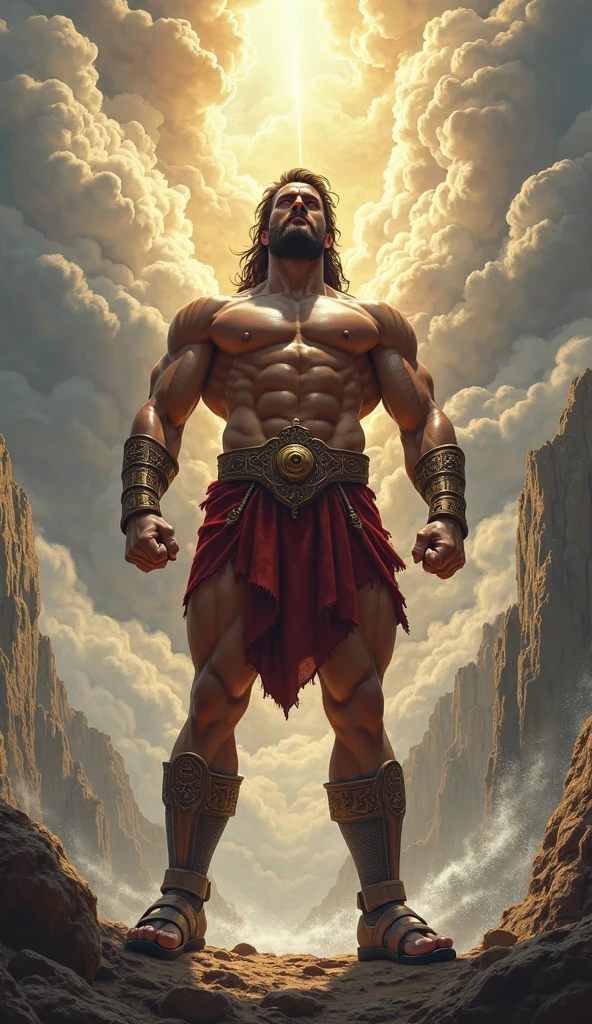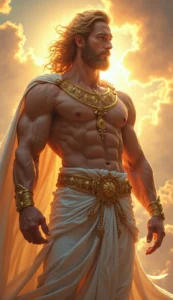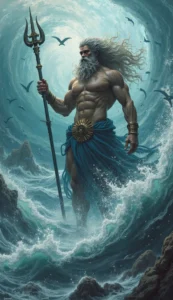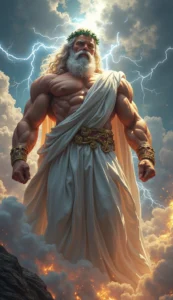Hercules: The Strongest Demigod!
Hercules: Born Divine, Cursed Mortal
By Eduardo Gryn, Historian & Mythology Buff
A God’s Secret Affair, a Mortal’s Burden
Let’s get one thing straight: Hercules (or Heracles in ancient Greek) wasn’t your average demigod. His origin story reads like a soap opera script. Born to Zeus—king of the gods—and the mortal queen Alcmene, his existence was a middle finger to the divine rulebook. Zeus, ever the troublemaker, disguised himself as Alcmene’s husband to pull off history’s most deceptive one-night stand. Nine months later, Hercules arrived—half-god, half-human, and 100% destined for chaos.
Hera’s Vendetta: A Stepmom’s Wrath
Zeus’ wife Hera didn’t take kindly to her husband’s latest fling. She turned Hercules into her personal punching bag, starting when he was just eight months old. She sent two venomous snakes to kill him in his crib. Most babies would cry; Hercules grabbed the snakes and choked them like they were stuffed toys. But Hera wasn’t done. Years later, she cursed him with temporary insanity, driving him to murder his own wife and children. The message was clear: “Cross me, and I’ll break your soul.”
Identity Crisis: Glory or Curse?
Fun fact: His original Greek name, Heracles, means “Glory of Hera”—a cruel joke, given her hatred. The Romans rebranded him as Hercules, sanding down the rough edges for their pantheon. But here’s the twist: Hera’s relentless vendetta made him a legend. Without her schemes, Hercules might’ve been just another demigod with good biceps.
The Twelve Labors: Punishment or Redemption?
After the horror of killing his family, Hercules sought forgiveness through the Twelve Labors—a series of impossible tasks assigned by his cousin King Eurystheus (Hera’s puppet). From slaying the invincible Nemean Lion to cleaning the Augean Stables (30 years of divine livestock waste), each labor was designed to break him. Instead, Hercules turned them into a masterclass in resilience. By Labor #6, he wasn’t just surviving; he was rewriting what it meant to be a hero.
Early Feats: Building a Reputation
Long before the Twelve Labors, Hercules was stacking wins (and red flags):
The Lion of Cithaeron
At 18, he strangled a lion terrorizing Thebes—bare-handed. The reward? Marriage to Princess Megara. But Hera’s madness curse turned this fairy tale into a bloodbath, setting the stage for his infamous labors.
Education Gone Wrong
Hercules trained under Greece’s best: archery with a master, wrestling with a trickster, even music with a lyre teacher. But when his music tutor criticized him, Hercules smashed the man’s skull with his own instrument. First lesson: Don’t critique a demigod’s playlist.
Why Hera Couldn’t Quit Him
Hera’s hatred wasn’t just jealousy—it was fear. Hercules threatened the divine order. A mortal with godlike strength? That scared the ambrosia out of Olympus. So she gaslit, manipulated, and sabotaged him at every turn. Even his later marriage to Deianira ended in Hera-engineered disaster (see: poisoned robe, agonizing death).
Trivia: Hercules’ Origin Stories You Missed
- His first name was Alcides—he renamed himself to mock Hera.
- He once fought a river god for a bride… and won by ripping off the god’s horn.
- Disney skipped the part where he murdered his family. Too dark for singing muses.
Hercules: The Labors That Made Him a Legend
The Twelve Labors: From Punishment to Glory
Hercules’ Twelve Labors weren’t just chores—they were cosmic trials designed to break him. Ordered by King Eurystheus (Hera’s puppet), each task pushed Hercules to the edge of mortality. Here’s the wild part: he turned suffering into legacy.
Labor #1: The Nemean Lion’s Hide
The Nemean Lion wasn’t your average big cat. Its golden fur was arrowproof, and its claws could shred bronze. Hercules choked it bare-handed, skinned it with its own claws, and wore the pelt like a trophy jacket. Eurystheus’ reaction? He hid in a bronze jar. Can’t blame him.
Labor #5: The Augean Stables
Cleaning 30 years of divine cattle waste in a day sounded impossible. But Hercules—always the problem-solver—rerouted two rivers to wash the stables clean. Eurystheus tried to disqualify him for “cheating,” but the public loved it. First recorded case of “work smarter, not harder.”
Gods, Monsters, and Hera’s Relentless Grudge
Hera wasn’t content with the Twelve Labors. She threw curveballs at every turn:
The Hydra’s Regenerative Heads
For Labor #2, Hera sent the Lernaean Hydra, a swamp-dwelling serpent with venomous blood and heads that regrew when cut. Hercules’ solution? Burn the necks with fire after each decapitation. Hera then declared it “didn’t count” because his nephew Iolaus helped. The pettiness was unreal.
Atlas’ Cosmic Side Quest
In Labor #11, Hercules had to steal golden apples guarded by the Hesperides. He tricked the Titan Atlas into fetching them by offering to hold the sky. When Atlas tried to ditch him, Hercules pretended to need a shoulder pad adjustment and bounced. Even Titans got played.
Beyond the Labors: Hercules’ Chaotic Resume
After the Twelve Labors, Hercules kept hustling. His post-grad era included:
Rescuing Hesione from a Sea Monster
King Laomedon promised Hercules divine horses for saving his daughter. When the king welched, Hercules sacked Troy years before the famous war. Lesson: Never stiff a demigod.
The Argonauts’ Bad Luck Charm
He joined Jason’s Argonauts but got left behind when Hera struck him with madness (again). His presence was like a cursed token—epic strength, but terrible luck.
Love, Loss, and a Poisoned Cloak
Hercules’ love life was a minefield of Hera’s sabotage:
Deianira and the Centaur’s Revenge
His marriage to Deianira ended tragically. A centaur named Nessus gave her a “love potion” (spoiler: it was hydra blood). When Hercules wore the poisoned cloak, it melted his skin. His solution? Build a funeral pyre and pray for Zeus to bail him out. It worked—sort of.
Apotheosis: From Mortal to God
After his fiery death, Zeus offered him a spot on Olympus. Even Hera relented, marrying him to her daughter Hebe (goddess of youth). Hercules became the patron of athletes and travelers—proof that even gods love a redemption arc.
Trivia: Hercules’ Most Savage Wins
- He once punched a river god so hard, the river changed course.
- The phrase “Herculean effort” comes from his labors—but he’d probably call it a Tuesday.
- Disney’s version skipped the part where he founded the Olympic Games. Priorities!
Hercules: The Mortal Who Conquered Death
The Poisoned Cloak: A Lover’s Betrayal
After surviving the Twelve Labors, Hercules faced his greatest foe yet: love. His marriage to Deianira seemed like a fresh start—until a jealous centaur named Nessus tricked her into gifting Hercules a cloak soaked in Hydra’s blood. The “gift” melted his skin like candle wax. In agony, Hercules built his own funeral pyre on Mount Oeta. But here’s the twist: his mortal body burned away, leaving only his divine half. Zeus swooped in, offering him a seat on Olympus. Even Hera finally relented, marrying him to her daughter Hebe, goddess of youth. Talk about a toxic in-law resolution.
Apotheosis: From Ashes to Godhood
Hercules’ ascension to godhood wasn’t just a reward—it was a PR move by Zeus to appease humanity. Greeks worshipped him as a protector of athletes, merchants, and anyone facing impossible odds. Temples like the Sanctuary of Hercules in Rome drew pilgrims seeking his “tough love” brand of miracles.
Hercules’ Legacy: The Hero Who Outlived the Gods
Long after Olympus fell silent, Hercules’ myth evolved. Here’s how he became antiquity’s ultimate survivor:
Roman Reinvention: Hercules Goes Global
The Romans rebranded him as Hercules, merging him with Phoenician and Egyptian gods. Emperor Commodus literally claimed to be his reincarnation, commissioning statues of himself cosplaying as the demigod. Meanwhile, soldiers carried his image into battle, believing his labors symbolized triumph over chaos.
Renaissance Resurgence: Art’s Favorite Muscleman
Artists like Michelangelo and Rubens turned Hercules into a symbol of human potential. The Farnese Hercules statue—showcasing his exhausted, post-labors body—became a Renaissance meme about perseverance. Even Shakespeare name-dropped him in plays as shorthand for “unbeatable underdog.”
Modern Mythology: From Comics to CGI
Hercules never left the spotlight. Here’s his 21st-century glow-up:
Marvel’s Herc: Champagne and Thunder
Marvel Comics turned him into a boozy, lovable oaf who teams up with Thor. The MCU’s version? A punchline in Thor: Ragnarok. Purists groaned, but let’s be real—Hercules would’ve loved the drama.
Disney’s Family-Friendly Flop
The 1997 film Hercules scrubbed his murderous rage and replaced it with singing muses. Critics called it “mythological sacrilege,” but it introduced him to Gen Z. Bonus points for making Hades a sassy villain—Hera probably hated that most.
The Hero’s Paradox: Brutal Strength, Human Flaws
Hercules resonated because he wasn’t perfect. His rage, regret, and redemption made him relatable—a superhero with a therapy bill. Philosophers like Seneca used his labors as metaphors for overcoming life’s trials. Even Freud might’ve diagnosed him with “chronic stepmom issues.”
Trivia: Hercules’ Undying Influence
- The Pillars of Hercules (Gibraltar) marked the ancient world’s edge—his final “labors” on Earth.
- He’s the only Greek hero with a constellation (Hercules) and a planet-moving space telescope named after him.
- Real-world “Hercules” brands range from military aircraft to bodybuilding supplements. The man’s a marketing goldmine.



